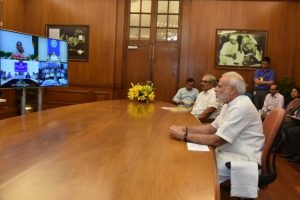Bangladesh has reached out to neighboring China for funding worth $6.4 billion for nine new infrastructure projects. Its outreach has triggered concern in New Delhi, prompting India’s Foreign Secretary Harsh Vardhan Shringla to dash across to Dhaka to discuss expediting Indian projects in Bangladesh.
Reportedly, Bangladesh has sought funding for the construction of the first phase of Payra seaport, the Barisal-Bhola bridge, and a technology park. Dhaka has also sought funding for management and restoration of the Teesta River.
Of all these, it is the Teesta project that has dominated media reporting in India. The Teesta originates in the Himalayas and runs through the Indian states of Sikkim and West Bengal before entering Bangladesh. Sharing its waters has been a contentious issue and India and Bangladesh have been on the verge of reaching an agreement several times over the past decade. However, domestic politics in India make a settlement elusive; water is a state issue in India, and West Bengal politicians have blocked New Delhi and Dhaka from signing a deal.
Weary of looking to India to address its water shortage problem, Bangladesh seems to have decided to improve management of the Teesta’s waters within its own boundaries. Importantly, it is turning to China for help. Beijing is said to be keen on supporting Dhaka on the project.
China-Bangladesh relations have improved remarkably in recent decades. The two countries became strategic partners in 2016. China is Bangladesh’s main arms supplier, investor, and trade partner. China has already invested $10 billion in Bangladesh toward a string of power and infrastructure projects under the Belt and Road Initiative.
Despite its mounting dependence on China, Bangladesh has been careful to balance its relations with India and China. The Awami League government has shown sensitivity to India’s security concerns. It has, for instance, avoided involving China in projects that would have implications for India’s security. It has also played an important role in supporting India’s counter-insurgency efforts in the Northeast by sending back to India militants taking sanctuary on its soil and shutting down insurgent training camps.
It is India that has underperformed in strengthening the India-Bangladesh relationship.
Successive governments in New Delhi have failed to deliver on their promise to settle the Teesta dispute, making it hard for the Awami League government to justify its cooperation with Delhi on issues of importance to India. The Narendra Modi government’s majoritarian rhetoric – Home Minister Amit Shah has described Bangladeshi immigrants to India as “termites” – and stance on immigration in general have upset Bangladeshis immensely. The Citizenship Amendment Act as well as the National Register of Citizens have serious implications for Bangladesh, but the Modi government pressed ahead without consulting the Bangladeshi government or heeding its concerns.
The Teesta water management project is reported to include building a reservoir in Bangladesh. This will enable Dhaka to store water for use in the lean season. It will reduce Bangladesh’s dependence on India to a certain extent. It lays bare India’s poor handling of its relations with Bangladesh and, should China’s fund and implement the project swiftly, will show China in a positive light.
































